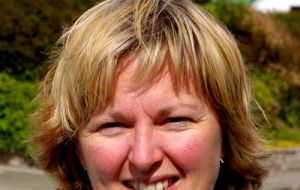MercoPress. South Atlantic News Agency
Falklands reduce toothfish catch for conservation reasons
 Andrea Clausen explains the new toothfish quota and fees
Andrea Clausen explains the new toothfish quota and fees THE Falkland Islands Government has reduced the Toothfish total allowable catch (TAC) for conservation reasons and have reduced fees accordingly despite the consequential loss in revenue
Following the setting of ITQ fees for Toothfish for 2008 in October 2007, scientists in the Government Fisheries Department, along with the complete support of the industry, recommended a reduction in the Toothfish TAC from 1500mt to 1200mt for conservation reasons. Councillor Andrea Clausen told MercoPressthis action resulted in an increase in the fee revenue ratio from around 15% (guideline for toothfish - as more valuable product) to 26%. She said, "Despite this increase the Director of Fisheries recommended to Executive Council that we defer a review of the fee until the third quarter of 2008, when revised price information could be taken into account." However, both the Fisheries Advisory Committee and Executive Council were firmly of the view that this recommendation reflected a change in policy for the setting of fees (from a lag situation to a real time situation) and the fact that only one fishery would be treated in this manner was untennable. To this end Executive Council approved a pro rata reduction in fees to the original fee revenue ratio. LoligoSpeaking of the Loligo ITQ fees for the 2008 Second Season, Councillor Clausen explained, "In April each year a paper comes to Executive Council with a recommendation for the ITQ fees for the second season of the Loligo fishery. "This paper is based on guidance from RRAG which is then considered by the Fisheries Advisory Committee who do not make a recommendation (given there are four members of the industry on the committee)." For some considerable time Executive Council have used a fee revenue ratio of 10% as a guide in setting the ITQ fees for the Loligo fishery. She said, "The formula used to calculate the fee is relatively simple but has been effective over the past 20 years. This year RRAG and the Fisheries Department provided a range of option for fees as they normally do, this time comprising: - No change - 2 -10% rise, - 3 - 20% rise - 4 -30% rise. Executive Council decided to adopt a 30% rise which resulted in an overall fee revenue ratio of 9.11%. "The downside of the formula we have for the calculation of fees is that it does not take into account exchange rates or changes in prices of volatile consumables such as fuel. "Whilst this is recognised by Executive Council there is currently no objective approach for dealing with this. To this end Executive Council have requested that a full review of the ITQ fee formula be carried out so that these issues alongside a number of others can be looked into. Argentine auditResponding to the recent story of the blasting audit report on Argentina's Fisheries Secretariat, Councillor Clausen said, "Both Hake and Illex are straddling stocks that utilise vast areas of the South West Atlantic covering the Argentine EEZ, the Falkland Island EEZ and the High Seas. "The Falkland Islands Government has been proactively seeking to protect and manage these stocks so they can be fished in a sustainable manner since the mid 1980's and more aggressively since the inception of the South Atlantic Fisheries Committee (SAFC) in 1991. "However, since mid 2005 the SAFC has in effect become moribund, and only meetings to discuss the mandate of the Committee have been held ever since. Nonetheless the Falkland Island Government remains committed to partaking in the sustainable management of the resources of the South West Atlantic and any effective regional management organisation that may be established to achieve this." Earlier this month Argentina's National Auditing Office accused the country's Fisheries Secretariat of lack of controls and transparency which have driven the hubssi and Illex squid resources to "the limit" because of over fishing. By Lisa Johnston- SeAled PR - Stanley



Top Comments
Disclaimer & comment rulesCommenting for this story is now closed.
If you have a Facebook account, become a fan and comment on our Facebook Page!